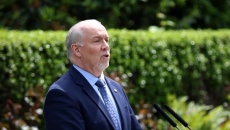The federal environment minister is backtracking on a previous decision to keep Ottawa out of the approval process for a major coal mine expansion in Alberta.
The existing Vista mine, which is owned by the U.S. coal giant Cline Group, began shipping coal for export in May 2019 and the company is now looking to double, or possibly even triple, its output.
Minister Jonathan Wilkinson declined in December to order a federal impact assessment of the project near Hinton, saying the potential risks to the environment and Indigenous rights would be dealt with by a provincial approval process.
Dozens of environmental, Indigenous, health and faith-based organizations wrote to Wilkinson this month asking him to take a second look at the expansion.
In a decision Thursday supporting a federal designation for the project, Wilkinson says the expansion may cause "adverse direct and cumulative effects" on areas of federal jurisdiction, such as fish and fish habitat, species at risk, and Indigenous peoples.
The decision also notes that the mine expansion would produce more than 18,600 tonnes of coal per day, which is above the total production capacity threshold of 5,000 tonnes per day in regulations of the Impact Assessment Act.
"The minister acknowledges that, cumulatively, the projects may result in adverse effects of greater magnitude to those previously considered," the decision reads.
"(Those effects) may not be mitigated through project design or the application of standard mitigation measures."
In 2017, Canada and the United Kingdom jointly launched the Powering Past Coal Alliance, aiming to convince the world's wealthiest countries to eliminate coal as a source of electricity by 2030, and the rest of the world to do so by 2050.
When the alliance began, Prime Minister Justin Trudeau called coal "the dirtiest of all fossil fuels.''
"Let me be very blunt about this. Coal represents perhaps the greatest challenge to the world not meeting its climate-change targets,'' Trudeau said. "Unless we reduce coal consumption, we are not going to be able to prevent catastrophic global warming.''






